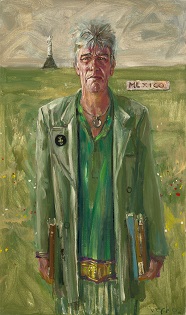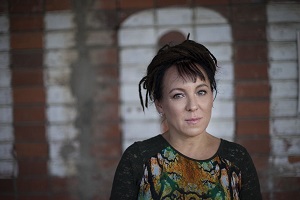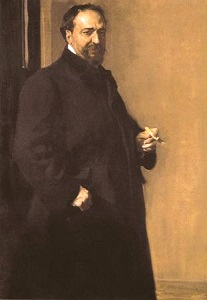De Nederlandse dichter en schrijver Hans Plomp werd op 29 januari 1944 in Amsterdam geboren. Zie ook alle tags voor Hans Plomp op dit blog.
Uit: Taras Bustos en de eeuwigheid
“Pas vele slopende weken nadat hij de fatale diagnose had, durfde dokter Poliot, lijfarts van de bekende vrijgezel-miljardair Taras Bustos (Doctor Honoris Causa), zijn Baas te vertellen aan welke vreselijke ziekte hij leed.
De baas reageerde als een ware stier, en zou Poliot met een tafelaansteker de hersens ingebeukt hebben, als deze niet met een wanhopige falsetto had gekrijst: ‘Wacht, wacht, Baas Bustos. Al is mijn nietswaardige leven niet waard verder geleefd te worden, als u mocht komen te overlijden, wacht toch op mijn laatste raadgeving voordat u mij verplettert.’
Bustos gooide de massieve tafelaansteker in het open vuur. Sinds hij ziek was geworden, bivakkeerde Bustos onder de kap van de reusachtige schouw in zijn landhuis. Op een simpele ligstoel zat hij de hele dag nors voor zich uit te kijken. En hij had de vreemde gewoonte ontwikkeld om alles wat hij had aangeraakt in het vuur te werpen, ongeacht waarde of schoonheid. Dokter Poliot hield het erop dat de Baas een ontsmettingsneurose had, dat hij alles wat hij met zijn zieke handen had aangeraakt, voorgoed onschadelijk wilde maken. Maar het was toch alweer weken geleden dat hij de Baas had ingelicht dat de ziekte niet besmettelijk was, en sindsdien was de verbrandingsmanie alleen maar groter geworden. Baas Bustos ging nu zelfs zover zijn hele bed te laten verbranden, meteen als hij zich ’s ochtends in de nieuwe ligstoel onder de schouw had laten zakken. Urenlang zat hij te kijken, hoe zijn personeel iedere dag het slaapkamerinterieur verbrandde in de haard. En als de voorraad brandbaar materiaal op was, kwam Bustos uit zijn stoel en bewoog zich kriskras door het huis, somber neuriënd. En alles wat hij op zijn korte wandeling aanraakte, moest vernietigd worden, tot de vloerkleden die hij met zijn sloffen had aangeraakt toe.
Vanaf de gaanderij sloeg Poliot hem soms urenlang onopgemerkt gade, doodsbang de Baas definitief in te lichten over de aard van zijn ziekte. En langzamerhand had Poliot ontdekt, dat de Baas de fatale aard van zijn kwaal moest kennen. Er was iets woests over Bustos gekomen, iets verwoestends, iets dat op een naderend einde duidde. In het huis was niets te merken van de maniakale aanval van de miljardair. Nog geen vijf minuten nadat de slaapkamer ontruimd was, droegen de mannen van een prominente firma een identiek meubelement binnen, iedere ochtend met dezelfde matte grap: ‘het wegwerpinterieur voor Doctor Bustos. Wilt u even tekenen alstublieft’.”

Hans Plomp (Amsterdam, 29 januari 1944)
Portret door Hennie van der Vegt. 2002


